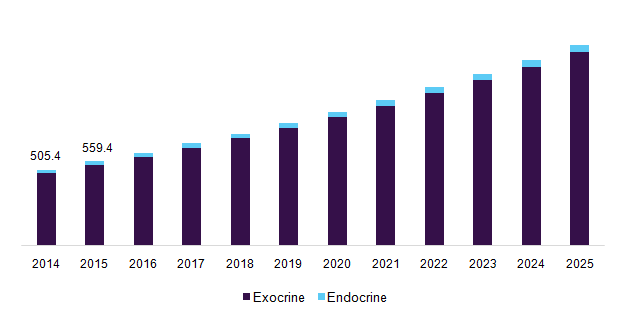May 2020 | Report Format: Electronic (PDF)
The global pancreatic cancer treatment market is expected to reach USD 4.2 billion in 2025, according to a new report by Grand View Research, Inc. Increasing tobacco consumption, smoking, obesity, and growing awareness pertaining to various treatment options available are propelling the market growth at a global level. The peak incidence of pancreatic cancer is seen in the age group of 65 to 75 years. Thus, growing geriatric population is also expected to drive the growth during the forecast period.
According to an article published in the National Center for Biotechnology Information in 2015, pancreatic cancer is one of the most dangerous malignancies and is the fourth most common cause of cancer deaths in the U.S. Furthermore, pancreatic cancer is expected to be the second common cause of death in the U.S., by 2030. These factors together would propel the market growth in the forecast period.

Further key findings from the study suggest:
- The study suggests that exocrine cancer is by far the most common type of pancreatic cancer accounting for more than 95% of the overall pancreatic cancer types
- Among the treatment types, targeted therapy occupied the largest share since it is considered as the most effective treatment option, which blocks the growth and spread of cancer cells without damaging healthy cells
- North America dominated the segment with the largest revenue share in 2015 due to high adoption rate of advanced treatment options and highly developed healthcare infrastructure
- Asia Pacific is anticipated to show a significant growth during the forecast period, mainly due to increasing government initiatives, growing awareness regarding the treatment options for pancreatic cancer, and the availability of highly sophisticated medical infrastructure for effective treatment
- Some of the major companies operating in this market are, but are not limited to, Eli Lilly and Company; Celgene Corporation; F. Hoffmann-La Roche AG; Amgen, Inc.; Novartis AG; PharmaCyte Biotech, Inc.; Clovis Oncology; Teva Pharmaceutical Industries Ltd.; Merck & Co., Inc.; and Pfizer, Inc.